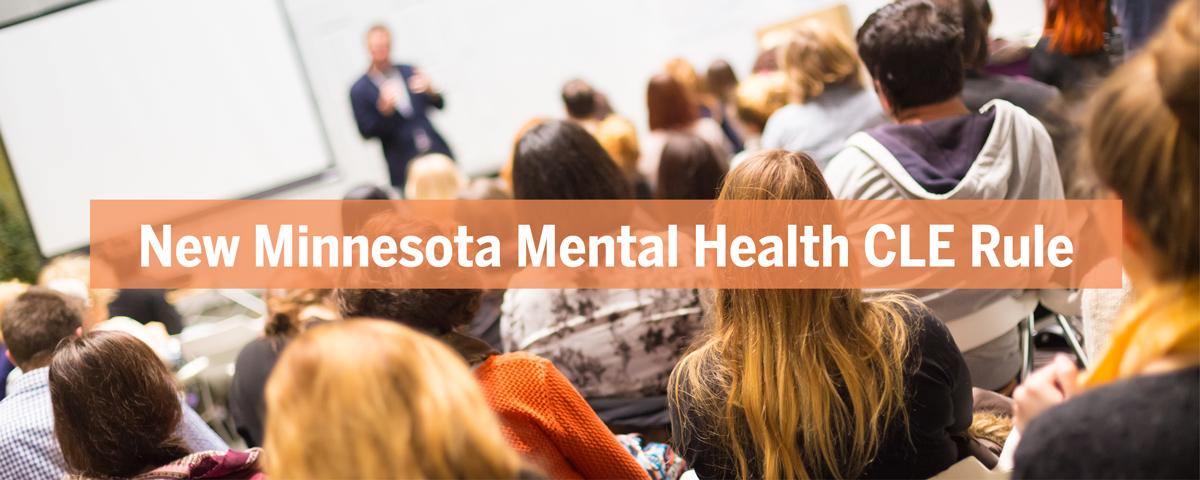
By Joan Bibelhausen
Effective July 1, 2024, each Minnesota lawyer “must report no fewer than 1 hour of approved courses in mental health and substance use in the legal profession and in the practice of law.”1 This requirement does not add credits but
includes the new category in the 45 credits already required for licensed attorneys.
Lawyers Concerned for Lawyers believes that this requirement for specialized credit will have positive influence in at least two ways. The first reason is thatt, since everyone must take a course, no one stands out. Stigma means that a lawyer who is struggling
may think others are noticing any steps they take to learn more about mental health or substance use issues. But because of this requirement, a lawyer may take that needed step to face a problem that has developed. At the same time, others will recognize
they are at risk and look for options before a difficulty becomes a disability.
Evan Tsai, chair of the Minnesota State Board of CLE, said the Board noted that well-being is accepted as a crucial element of our profession (The ABA passed a model rule in 2017). It is common sense that we look out for each other. Rules and expectations
make our profession stronger. These programs can offer a moment where you can think about how you can improve your life; how you can practice better. It's like a seatbelt.
The second influence LCL believes this requirement will have is that an attorney may be in denial about potential mental health issues and attend involuntarily (or say they are)—they are resisting education on well-being because the topics are too
close to home. When an individual is suffering from a mental health challenge, including a substance use disorder, denial means that the person is unable to accept that the problem is significant, and that anyone else is affected. Attending a CLE
may be a small but key step in the process of overcoming denial.
The MSBA supported this rule change. Sarah Soucie Eyberg, MSBA Assembly Representative to the MSBA Board of Governors, and member of the MSBA Well-Being Committee spoke in support of this decision prior to the vote. She noted that it is important to have
repeated exposure to these topics. While you take a Professional Responsibility course in law school, you still are required to complete ethics CLEs to maintain competence. The mental health CLE requirement will provide awareness and tools to reach
out if you are concerned for yourself or someone else. It will show that what is affecting you is affecting others and that you can reach out for help as others have done. The data on suicidal ideation in our profession shows that there is an emergency.
This requirement can help raise awareness and reduce our risk.
When applying for credit, a sponsor must provide a narrative indicating how the course “addresses issues in the legal profession and in the practice of law, is taught by someone with particular knowledge of impairment and well-being in the legal
profession and includes information on lawyer wellness programs and local resources.” LCL offers many programs that will meet this requirement.
LCL creates programs with the intention of reaching attendees who:
- are ready to consider seeking help for a mental health or substance issue
- are seeking resources to reduce their risk
- are concerned about a colleague, client, or someone else they care about who may be struggling
- would like to have a better understanding of the risks, challenges, and opportunities in our profession.
LCL receives many calls for help from attorneys after attending our CLE programs. Something resonates. One attendee at a bar convention program printed the LCL slide on “signs of impairment,” folded it up, and kept it in their wallet to remind
them of how these factors rang true during the program and that it was time to get help. Another called LCL on a Monday morning after a presentation to a bar organization the week before and said it felt like we were talking about them. Yet another
said they realized they were not alone and could get help when they heard someone else’s story of recovery at a bar organization dinner. Each of these were events where all members or attendees at a bar meeting would attend regardless of the
topic. There was no stigma to being seen. However, if learning more about mental health issues is optional, they may choose not to attend CLEs on well-being.
During Covid, many people became more aware that they needed mental health support. The barriers to seeking help, such as stigma, were lessened. Everyone was under stress, so everyone needed support. This new CLE requirement will both support and extend
that reduction of stigma. LCL looks forward to continuing to serve our profession with free and confidential services along with compelling and critical educational programs. Contact LCL (www.mnlcl.org) to learn more or to arrange a program.
 Joan Bibelhausen is Executive Director of Lawyers Concerned for Lawyers.
Joan Bibelhausen is Executive Director of Lawyers Concerned for Lawyers.
Notes
1. Review the new Rule at https://cle.mn.gov/wp-content/uploads/2024/03/Administrative-Order-Rules-2.23.2024.pdf.